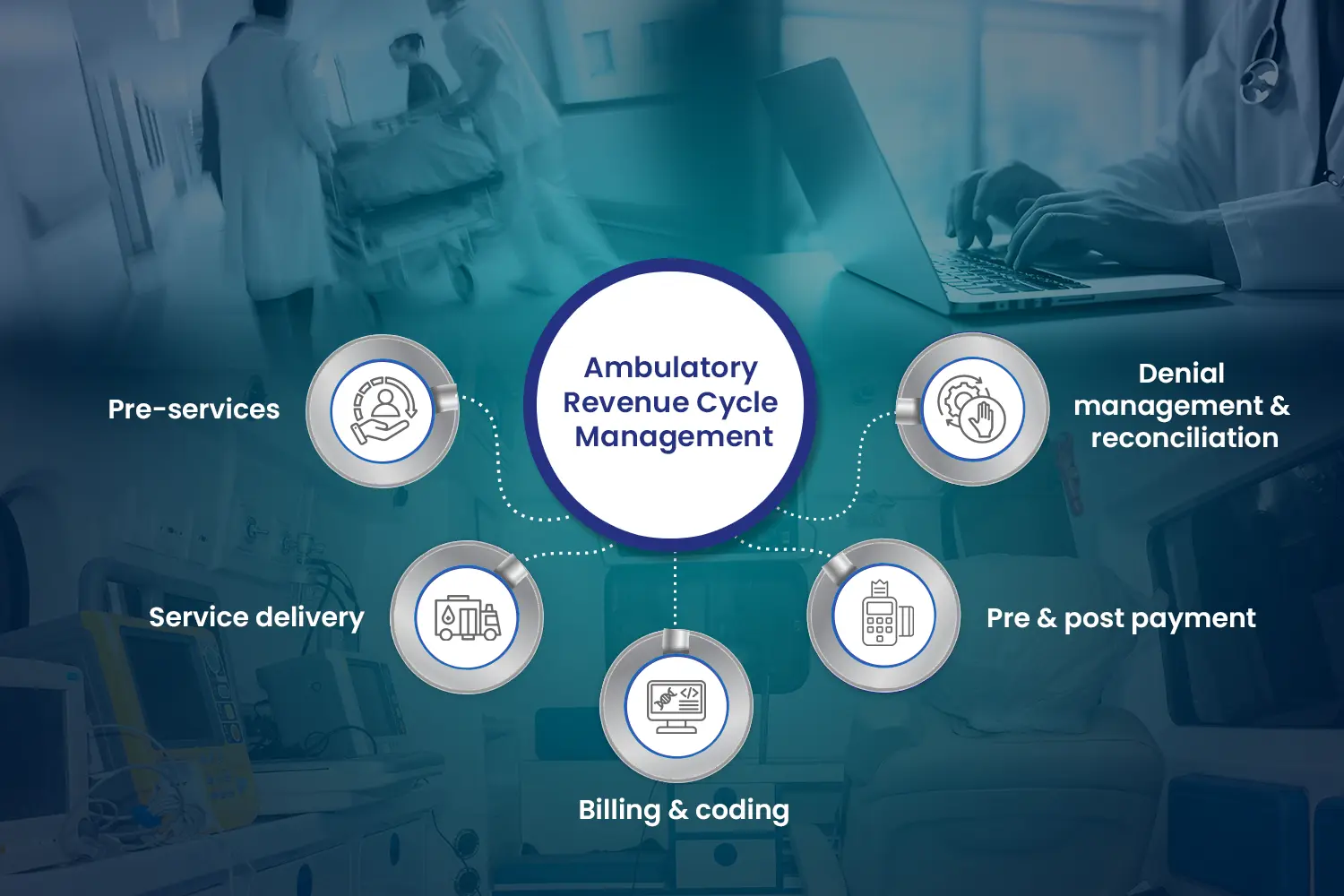
The Benefits of Outsourcing Your Ambulatory Revenue Cycle Management Services
Explore the advantages of outsourcing your ambulatory revenue cycle management services. Learn how it can optimize efficiency, reduce cost, and enhance patient satisfaction.
What does Outsourcing Ambulatory Revenue Cycle Management (RCM) mean?
Revenue cycle management is one of the most crucial tasks in the healthcare landscape. As the name implies, it deals with managing the financial aspects of an organization. It includes patient registration and scheduling, eligibility verification, charge capture, coding, claim submission, reports and analysis, and bill collection.
Typically, the organizations themselves are in charge of managing the revenue management cycle. However, there are some shortcomings in the organizations managing the revenue cycle themselves. That’s where outsourcing comes in handy. Outsourcing provides revenue cycle management services to healthcare industries.
The article aims to share the benefits of outsourcing ambulatory revenue cycle management services.
Understanding Ambulatory Revenue Cycle Management
An ambulatory service provider deals with emergency medical services. Ambulatory revenue cycle management comprises the collection of revenue from patients and the rendering of services. Here are some key components of ambulatory revenue cycle management:
● Pre-services: pre-service includes patient scheduling and registration, eligibility and benefits verification, and pre-authorization
● Service delivery: This involves documentation. While admitting a patient, the healthcare provider has to carefully verify the information provided and analyze the charts and reports produced after the procedures are performed
● Billing and coding: This involves assigning accurate medical codes for medical services provided. Assigning codes like ICD-10 for diagnoses and CPT for procedures is crucial to ensuring proper reimbursement from insurance companies
● Pre- and post-payment: The insurance companies will disburse the amount based on the patient’s insurance plan after verifying the medical codes, policies, and guidelines. This may require a lot of automated and manual reviews. The organization has to follow up on the patients and collect the remaining patient responsibility
● Denial management and reconciliation: If a claim is rejected by the insurance company due to a lack of proper information, appropriate actions should be taken to re-analyze the information provided. Moreover, all the money received from insurance and the patients should be carefully managed and kept track of to produce accurate financial reports
The Benefits of Outsourcing Ambulatory Revenue Cycle Management
Juggling patients and the revenue cycle can be exhaustive and stressful for a healthcare organization. Due to stress, there are chances of errors. Here are some revenue-cycle outsourcing benefits:
● Cost-effective – Maintaining an in-house RCM can break the bank. It requires hiring staff with technical skills like coding and EMS billing expertise. Outsourcing eliminates the need for technical expertise since they will take over the technical processes like coding and billing. This can result in a significant amount of savings and increased revenue
Reduced Compliance Risksay,
● RCM companies stay up-to-date with market trends, which includes using cutting-edge tools and ensuring accurate claims and best practices to reduce the risk of penalties and audits
● RCM companies have well-trained employees who know how to deal with claim denials. They can identify the reason for the denial in one go and rectify the mistakes, resulting in minimized lost revenue.
Overall Cost savings
● By letting the RCM companies handle the administrative burdens, the healthcare organization cuts the following costs:
➔ Reduced staffing costs (salaries, benefits, and turnover)
➔ Saving the money spent on RCM software and IT infrastructure
➔ Increased cash flow
➔ Increased revenue collection through efficient patient billing processes
➔ Reduced risk.
In other words, when ambulatory care billing companies manage the billing services, it frees up healthcare professionals to concentrate on patient care, which promotes trust.
Pain Points of ASPs Managing their RCM in-house
● Complex Coding and Compliance
● Time-sensitive billing and reimbursement
● Limited resources and expertise
● Divided Focus
● Managing multiple payers.
What Will Happen If Outsourced to the Wrong Vendor?
If an ASP fails to outsource its revenue management cycle to the right vendor, it will have to face several negative consequences, including:
● Increased claim denials
● Delayed reimbursement
● Backlogs and delays
● Compliance risks
● Billing errors
● Delayed collections.
Outsourcing with the right vendor can save a lot of money with reduced staffing costs, improved cash flow, increased revenue collection, and reduced compliance risks.
Latest Trends in ASP Billing and Coding
The landscape is constantly evolving due to changes in regulations and technical advancements. Here’s a list of the latest trends:
● Telemedicine expansion
● ICD-10 updates
● Value-based reimbursements
● Prior authorization requirements
● Documentation and compliance
● Technology integration
● CMS updates.
In short…
Outsourcing with a revenue cycle management company is effective in reducing overhead costs, streamlining processes and workflows, and reducing the risks of errors and legal actions. In the ever-growing landscape, outsourcing with a vendor who sticks with the CMS guidelines is more of a necessity than an option.